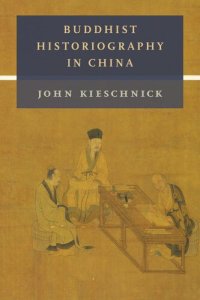
Ebook: Buddhist Historiography in China
Author: John Kieschnick
- Genre: Religion // Buddhism
- Tags: Buddhism Religious Studies Theology and Religion
- Series: The Sheng Yen Series in Chinese Buddhist Studies
- Year: 2022
- Publisher: Columbia University Press
- Language: English
- pdf
About this book
John Kieschnick provides an innovative, expansive account of how Chinese Buddhists have sought to understand their history through a Buddhist lens. Exploring a series of themes in mainstream Buddhist historiographical works from the fifth to the twentieth century, he looks for what they tell us about their compilers’ understanding of history.
Author information
John Kieschnick is The Robert H. N. Ho Family Foundation Professor of Buddhist Studies at Stanford University. He is the author of The Eminent Monk: Buddhist Ideals in Medieval Chinese Hagiography (1997) and The Impact of Buddhism on Chinese Material Culture (2003), and coeditor of India in the Chinese Imagination (2014).
Reviews
Grant Hardy, author of Worlds of Bronze and Bamboo: Sima Qian's Conquest of History:
Somewhat surprisingly, Buddhist historiography has not received much sustained attention before, at least in the West, despite voluminous studies of Chinese historical writing. Kieschnick introduces this subject, delineates its major contours, and argues for its significance. This book will change the way that future studies of Chinese historiography will be written.
James A. Benn, author of Tea in China: A Religious and Cultural History:
This book tells us a great deal about a genre of Buddhist writing that we have not understood well so far because of its massive and chronological nature. The patterns of Chinese Buddhist histories are hard to see unless one has read all of them. Buddhist Historiography in China is an excellent critical orientation to this material, written in a lively and engaging way that makes it really enjoyable and informative to read.
John Kieschnick provides an innovative, expansive account of how Chinese Buddhists have sought to understand their history through a Buddhist lens. Exploring a series of themes in mainstream Buddhist historiographical works from the fifth to the twentieth century, he looks for what they tell us about their compilers’ understanding of history.
Author information
John Kieschnick is The Robert H. N. Ho Family Foundation Professor of Buddhist Studies at Stanford University. He is the author of The Eminent Monk: Buddhist Ideals in Medieval Chinese Hagiography (1997) and The Impact of Buddhism on Chinese Material Culture (2003), and coeditor of India in the Chinese Imagination (2014).
Reviews
Grant Hardy, author of Worlds of Bronze and Bamboo: Sima Qian's Conquest of History:
Somewhat surprisingly, Buddhist historiography has not received much sustained attention before, at least in the West, despite voluminous studies of Chinese historical writing. Kieschnick introduces this subject, delineates its major contours, and argues for its significance. This book will change the way that future studies of Chinese historiography will be written.
James A. Benn, author of Tea in China: A Religious and Cultural History:
This book tells us a great deal about a genre of Buddhist writing that we have not understood well so far because of its massive and chronological nature. The patterns of Chinese Buddhist histories are hard to see unless one has read all of them. Buddhist Historiography in China is an excellent critical orientation to this material, written in a lively and engaging way that makes it really enjoyable and informative to read.
Download the book Buddhist Historiography in China for free or read online
Continue reading on any device:

Last viewed books
Related books
{related-news}
Comments (0)